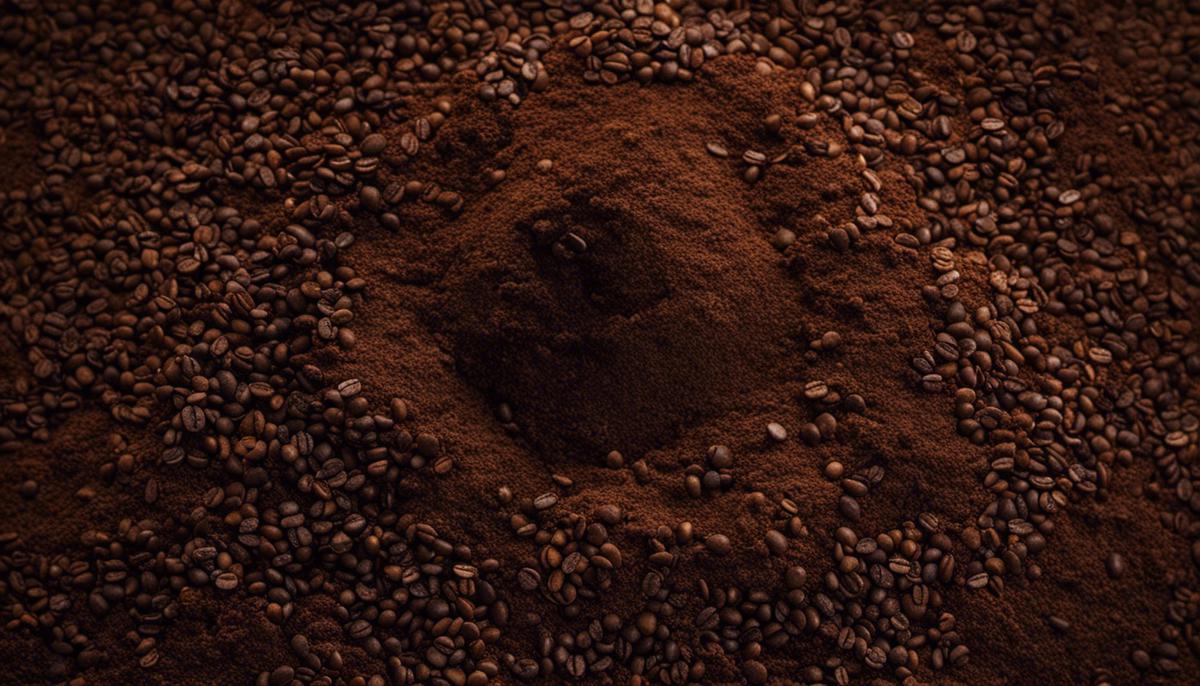Coffee Grounds & Tomato Plants: An In-depth Scientific Analysis

As lovers of a hearty brew, many of us create a bounty of coffee grounds each day without a second thought to their potential uses. One such application is their potential promise in nurturing the growth of tomatoes, a staple in numerous culinary dishes worldwide. Our exploration begins with an investigation into the nutritional composition of coffee grounds, highlighting their levels of essential nutrients like Nitrogen, Potassium, and Phosphorus necessary for tomato plant development. Subsequently, we’ll venture into the landscape of soil pH and the acidity levels of coffee grounds, elucidating their effects on the overall condition of the soil geared towards tomato cultivation. Our discussion unravels with a perusal through empirical evidence derived from field studies and scientific experiments revolving around the infusion of coffee grounds in the soil for better tomato yields.
Nutritional Composition of Coffee Grounds
The Nutritional Composition of Coffee Grounds: A Hidden Treasure for Tomato Plants
Coffee grounds, the residual matter post the brewing process, pose a fascinating world of untapped nutrients that potentially could benefit a wide range of plants. While this agro-waste product is typically overlooked, a deeper understanding of its nutritional composition reveals substantial organic benefits, notably for tomato plants.
Firstly, allow this exploration to begin at the elemental level. Coffee grounds consist of a rich palette of macro and micronutrients. Primary nutrients such as nitrogen (N), phosphorus (P), and potassium (K) – the coveted NPK triumvirate in horticulture – occur in substantial amounts. Specifically, coffee grounds harbor around 2% nitrogen by volume, which is an imperative nutrient for plant growth and development. In addition to NPK, calcium and magnesium form integral portions of the nutritional composition, aiding in vital plant functions like photosynthesis and enzymatic activities.
Beyond macro elements, coffee grounds are resplendent with an array of micronutrients, including copper, manganese and zinc, all underpinning different plant metabolic processes. The organic matter content is also significant, as much as 45% to 50% by weight, which when added to soil can enhance its texture, water-holding capacity, and aeration properties.
Turning attention to tomato plants, it’s widely accepted that they flourish in well-drained, nutrient-rich soils which maintain a slightly acidic pH. Coffee grounds, fortuitously, satisfy these conditions. Its slightly acidic pH (6.5 to 6.8), aligns perfectly with the optimal pH range for tomatoes – theoretically presenting a symbiotic solution.
Adjudicated as heavy feeders, tomato plants have a high demand for nutrients throughout their growing season, specifically nitrogen and calcium. Coffee grounds, rich in nitrogen content, ensure robust growth and lustrous green foliage. At a more subtle level, the calcium present in coffee grounds contributes to the strengthening of cell walls, reducing occurrences of end rot. Moreover, the added organic matter improves soil structure, facilitates root penetration, and as a result, boosts nutrient uptake.
However, as promising as these findings appear, careful implementation is paramount. The high nitrogen content may lead to an imbalanced NPK ratio if overused, inhibiting the uptake of other necessary nutrients and creating lush vegetation at the expense of fruit mass. Therefore, a careful balance should be struck.
In conclusion, the nutrient-rich profile of coffee grounds ostensibly offers substantial benefit to tomato plants. By understanding the specific needs of these plants and the nutrient composition of coffee grounds, gardeners may well find in their morning cup of joe not only personal rejuvenation but also a secret ingredient for a thriving tomato harvest. But like all good science, it is a reminder that further research is necessary to understand and optimize these relationships. Can this be the start of a revolution in organic farming and waste management practices? Only time and rigorous scientific exploration will tell.

Acidity Levels of Coffee Grounds and Soil pH
Navigating the Acidic Component of Coffee Grounds: A Study in Soil pH
The study of soil science necessitates a digression into the realm of acidity and alkalinity, or more commonly, the pH scale. The pH of soil is a rudimentary factor influencing the fertility, structure, and overall health of the soil, playing an instrumental role in the availability of vital nutrients required by plants for growth and development. The intriguing aspect of this discourse lies in the introduction of coffee grounds, more specifically, on the effects of their inherent acidity levels on soil pH.
Coffee grounds, in essence, are a byproduct of brewing coffee, characterized predominantly by their acidic nature with a pH generally hovering around 6.5 to 6.8, which treads towards the acidic end of the pH scale. However, their acidic tendencies are largely nullified upon brewing, resulting in a pH that leans towards the neutral territory. It’s salient to note that the incorporation of these supposedly acidic coffee grounds to the soil doesn’t necessarily render the soil more acidic.
Interestingly, this common perception is a result of a partial understanding of the process wherein pH is evaluated before the constituent elements within the coffee grounds can be fully broken down or composted. The dynamics of pH alteration take a more nuanced path. Coffee grounds increase the presence of organic materials in the soil, which in turn attracts beneficial organisms like earthworms and other microorganisms, pivotal for composting. The composting process results in a slightly lowered, mildly acidic pH, which is especially beneficial for acid-loving plants, including notable examples such as tomatoes.
In integrating coffee grounds into soil, one must keep a vigilant eye on the overall composition of the soil. The grounds should not constitute more than 15-20% of the entire volume. Why so, one might ask? This moderate introduction serves to mitigate Compact Soil Syndrome. Coffee grounds—akin to clay—are tiny and prone to compacting when wet which can lead to poor aeration and over-saturation, conditions inimical to plant growth.
Moreover, the application of coffee grounds extends beyond a simple mix with soil. Consider the practice of vermicomposting, wherein coffee grounds serve as an ideal feedstock for worms. Worms process these grounds and the excreted ‘worm castings’ are nutrient-dense, offering enhanced fertility and structure to the soil. Remarkably, these castings impart a neutral pH to the soil, managing the conundrum of soil acidity adeptly.
Understanding the science behind the acidity of coffee grounds can lend meaningful insights into sustainable farming. From composting to vermicomposting, their utility is undeniable. However, caution must be heeded to prevent any untoward compaction or nutrient imbalance in the soil. The exploration of coffee grounds and their relationship, not only to the nutritional component of the soil, but also to the pH level, brings together two seemingly contrasting realms of agriculture and gastronomy. And therein, one discovers the healthy confluence of sustainability and innovation.

Experimental Evidence and Field Studies
The pH level of soil plays a quintessential role in ascertaining its fertility, health, and its overall capacity to support plant growth. This is specially true for tomato plants. Coffee grounds, intriguingly, can contribute to manipulating and maintaining soil pH to the benefit of diverse plant species such as tomatoes.
Coffee grounds are inherently acidic, with a pH often falling between 6.5 and 6.8; however, their acidifying effect on soil is commonly misinterpreted and exaggerated. A popular misconception operates under the belief that incorporating coffee grounds into soil will render it acidic, which while seeming logical, does not hold true under scientific scrutiny. Studies have demonstrated that when used as a soil amendment, coffee grounds have a rather neutral effect on the soil’s pH.
A phenomenal result of integrating coffee grounds into soil is their role in ameliorating composting procedures. Coffee grounds, owing to their nitrogen content and composition, can attract a wealth of beneficial organisms like earthworms and mushroom mycelium to your garden plots. These organisms spark life into the soil, enhancing its fertility by breaking down organic matter into nutrients that plants can more readily absorb.
Caution, nevertheless, must be exercised in the use of coffee grounds. Heavy-handed application can lead to the development of Compact Soil Syndrome which diminishes a soil’s porosity, negatively impacting root growth while also reducing overall aeration. Gardens and fields that fall victim to this can suffer from poor water drainage and a decline in plant health. Recent case studies have suggested incorporating no more than 15-20% coffee grounds by volume in your soil to mitigate the onset of such detrimental effects.
On the topic of soil residents, the judicious application of coffee grounds can also contribute significantly to vermicicuture or ‘worm farming’. Comprising a substantial portion of a worm’s diet, coffee grounds when consumed by worms are transformed into nutrient-rich worm castings — adding another layer to the soil’s nutrient density. Essentially, the coffee grounds aid in creating a symbiotic habitat between the flora and fauna of the soil.
Conclusionally, the realm of sustainable farming is where the application of coffee grounds truly shines. Organic waste produced by households and coffee shops, which might otherwise contribute to landfill, can be harnessed by agriculture – turning waste into a true resource. This brilliant agricultural practice bridges the gap between agriculture and gastronomy, embodying a circular economic model at a micro level and generating incredible opportunity for the future of sustainable, urban farming.

Navigating through the realm of experimental evidence and field studies, we have surveyed the benefits and potential challenges of using coffee grounds as a soil enhancer for tomato growth. The juxtaposition of coffee grounds’ nutrient content, their impact on soil pH, alongside their practical implementation, paints a compelling picture for all garden enthusiasts. While the debate continues in scientific circles, the undeniable contributions of coffee grounds, especially in terms of certain nutrients critical for tomato plant vitality, stand as a testament to viable, sustainable farming techniques using everyday waste. Hence, giving our morning coffee grounds a second life in our garden might not be far-fetched but rather a key to unearthing high-yielding home-grown tomatoes.



